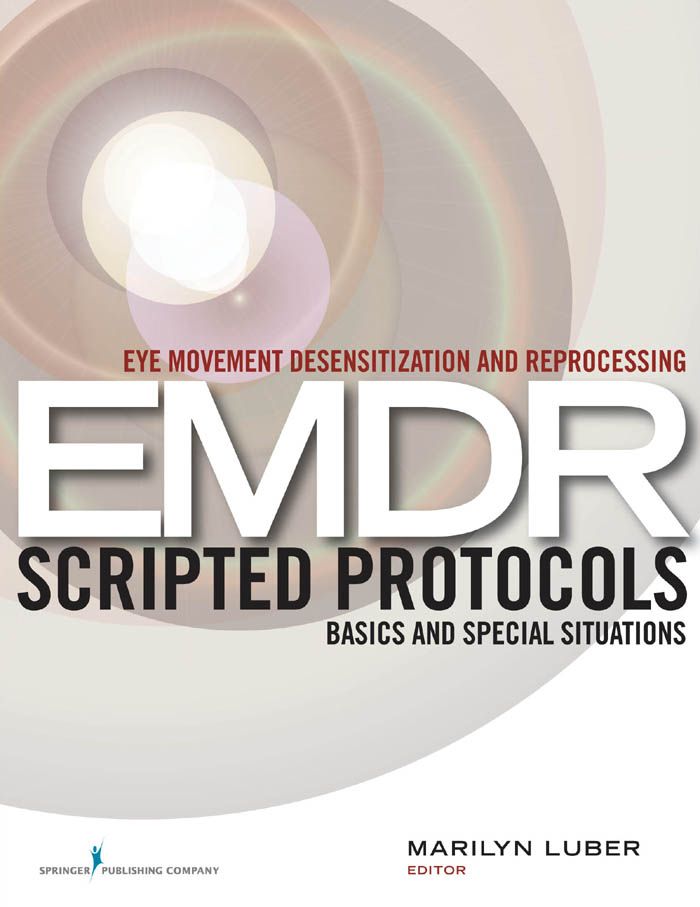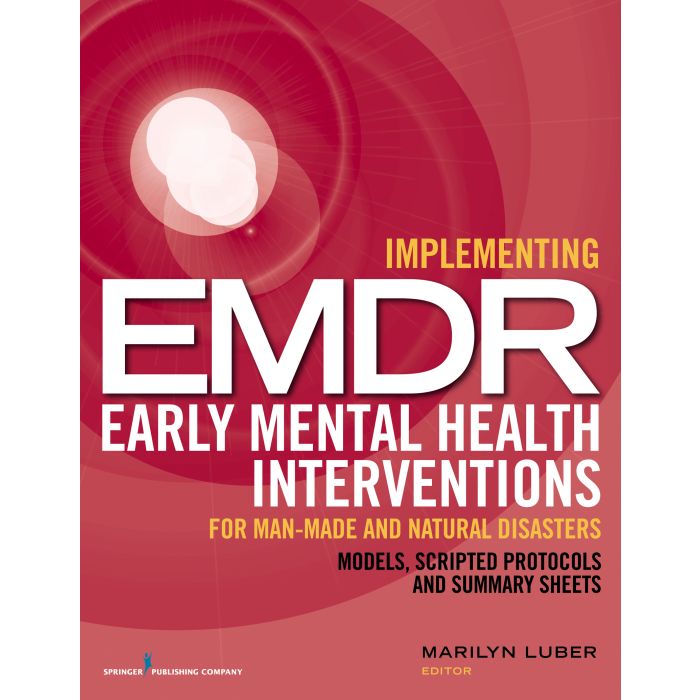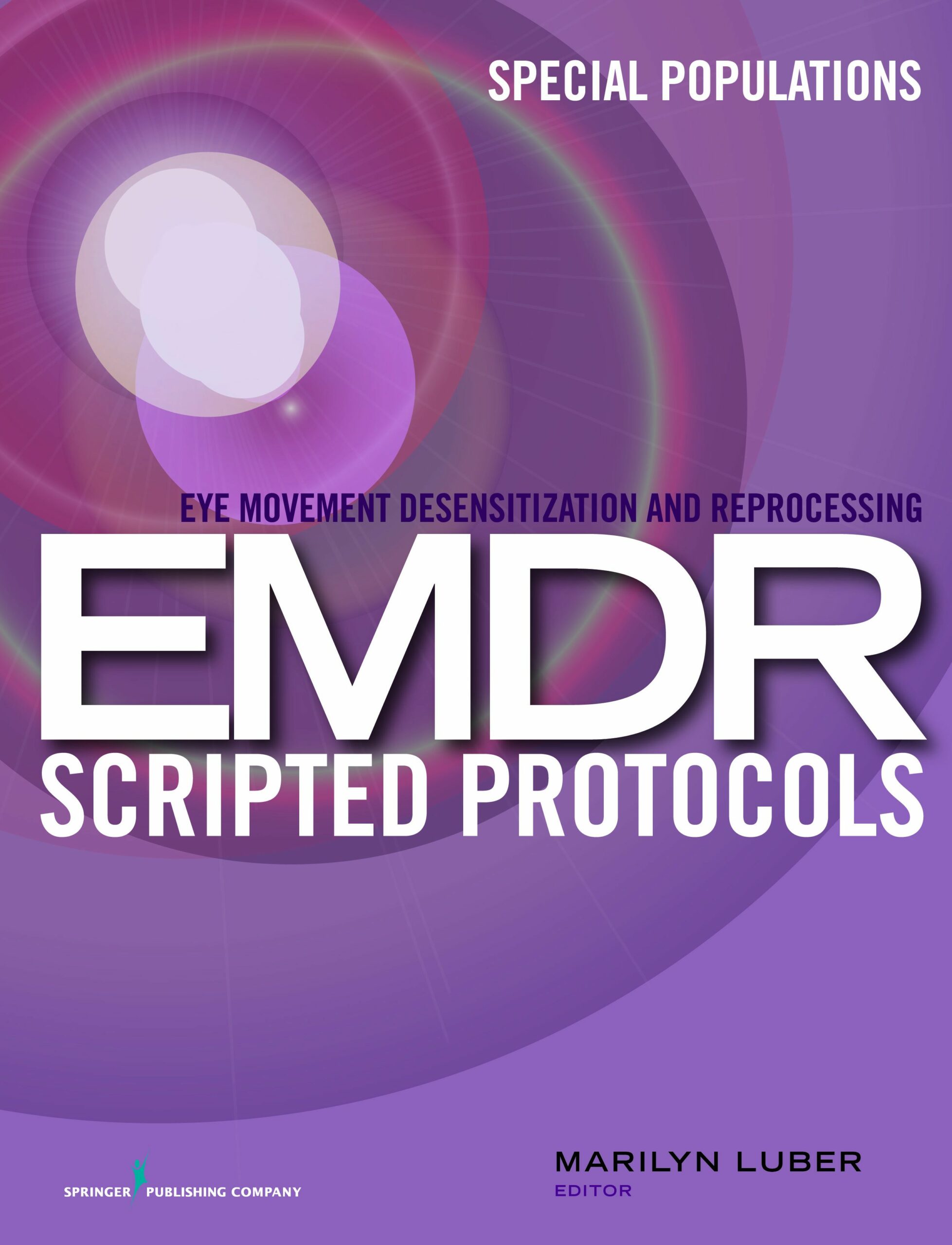Eye Movement Desensitization and Reprocessing (EMDR) Scripted Protocols: Basics and Special Situations
This book serves as a one-stop resource where therapists can access a wide range of word-for-word scripted protocols for EMDR practice.
About the Book
“This book serves as a one-stop resource where therapists can access a wide range of word-for-word scripted protocols for EMDR practice, including the past, present, and future templates. These scripts are conveniently outlined in an easy-to-use, manual style template for therapists, allowing them to have a reliable, consistent form and procedure when using EMDR with clients.
The book contains an entire section on the development of resources and on clinician self-care. There is a self-awareness questionnaire to assist clinicians in identifying potential problems that often arise in treatment, allowing for strategies to deal with them. Also included are helpful past memory, current triggers and future template worksheet scripts.
Key topics include:
- Client history taking that will inform the treatment process of patients
- Resource development to help clients identify and target their problems to regain control when issues appear overwhelming
- Scripts for the 6 basic EMDR Protocols for traumatic events, current anxieties and behaviors, recent traumatic events, phobias, excessive grief, and illness and somatic disorders
- Early intervention procedures for man-made and natural catastrophes
- EMDR and early interventions for groups, including work with children, adolescents, and adults
- Written workbook format for individual or group EMDR
- EMDR to enhance performance and positive emotion”
—Description from publisher
Table of Contents
“Preface / Marilyn Luber
Part I Client History
Chapter 1 EMDR Summary Sheet
Chapter 2 History Taking: The Time Line
Chapter 3 Simple or Comprehensive Treatment Intake Questionnaire and Guidelines for Targeting Sequence
Chapter 4 The EMDR-Accelerated Information Resourcing (EMDR-AIR) Protocol
Part II EMDR, Trauma, and Adaptive Information Processing (AIP) Model Explanations
Chapter 5 When Words and Pictures Fail: An Introduction to Adaptive Information Processing
Chapter 6 Introducing Adaptive Information Processing (AIP) and EMDR: Affect Management and Self-Mastery of Triggers
Part III Creating Resources
Chapter 7 The Safe/Calm Place Protocol
Chapter 8 The Inner Safe Place
Chapter 9 Four Elements Exercise for Stress Management
Chapter 10 Managing the “Fear of Fear”
Chapter 11 Resource Strengthening
Chapter 12 Extending Resources
Chapter 13 The Wedging Technique
Chapter 14 Resource Connection Envelope (RCE) in the EMDR Standard Protocol
Chapter 15 The Resource Map
Part IV EMDR and Special Targeting
Chapter 16 The EMDR Drawing Protocol for Adults
Chapter 17 The Image Director Technique for Dreams
Part V Francine Shapiro’s Protocols Scripted
Chapter 18 Single Traumatic Event
Chapter 19 Current Anxiety and Behavior
Chapter 20 Recent Traumatic Events Protocol
Chapter 21 Phobia Protocol
Chapter 22 Protocol for Excessive Grief
Chapter 23 Illness and Somatic Disorders Protocol
Part VI Early Intervention Procedures for Man-Made and Natural Catastrophes
Chapter 24 EMDR for Mining and Related Trauma: The Underground Trauma Protocol
Chapter 25 EMDR “Blind” to Therapists Protocol”
Chapter 26 EMDR Emergency Room and Ward Protocol (EMR-ER)
Chapter 27 The Recent-Traumatic Episode Protocol (R-TEP): An Integrative Protocol for Early EMDR Intervention (EEI)
Chapter 28 Emergency Response Procedure
Part VII EMDR and Early Interventions for Groups
Chapter 29 The EMDR Integrative Group Treatment Protocol (IGTP)
Chapter 30 The Imma Group Protocol
Chapter 31 A Written Workbook for Individual or Group EMDR
Part VIII EMDR and Performance Enhancement
Chapter 32 Enhancing Positive Emotion and Performance with EMDR
Chapter 33 EMDR Performance Enhancement Psychology Protocol
Part IX EMDR and Clinician Self-Care
Chapter 34 Self-Care for EMDR Practitioners
Chapter 35 The Clinician Self-Awareness Questionnaire in EMDR
Appendix A: Worksheets
Present Trigger Worksheet Script
Future Template Worksheet
Appendix B: Expanding the 11-Step Procedure
Unconsolidated Sensory Triggers and Desensitization: Running the Tape
Running the Tape with Triggers that Occur After Processing
Script for Running the Tape to Identify and Process Unconsolidated Sensory Triggers
Appendix C: EMDR Worldwide Associations and Other Resources
Contact Information
References
Future Readings and Presentations”
—Description from publisher
Book Access
Purchase/Subscription Required
Luber, M. (Ed.). (2009). Eye Movement Desensitization and Reprocessing (EMDR) Scripted Protocols: Basics and Special Situations. New York, NY: Springer Publishing. https://www.springerpub.com/behavioral-sciences/emdr/eye-movement-desensitization-and-reprocessing-emdr-scripted-protocols-9780826122377.html
- ISBN: 9780826122377
- eBook ISBN: 9780826122384
Date
May 18, 2009
Creator(s)
Marilyn Luber
Topics
Anxiety/Panic/Phobias, Grief, Medical/Somatic, Tragedies
Client Population
Adolescents, Children
Practice & Methods
8 Phases, Case Conceptualization, EMDR Early Intervention, Group, Protocols, Self-Care
Extent
480 pages
Publisher
Springer
APA Citation
Luber, M. (Ed.). (2009). Eye Movement Desensitization and Reprocessing (EMDR) Scripted Protocols: Basics and Special Situations. New York, NY: Springer Publishing. https://www.springerpub.com/behavioral-sciences/emdr/eye-movement-desensitization-and-reprocessing-emdr-scripted-protocols-9780826122377.html
Audience
EMDR Therapists
Language
English
Content Type
Book
Access Type
External Resource





